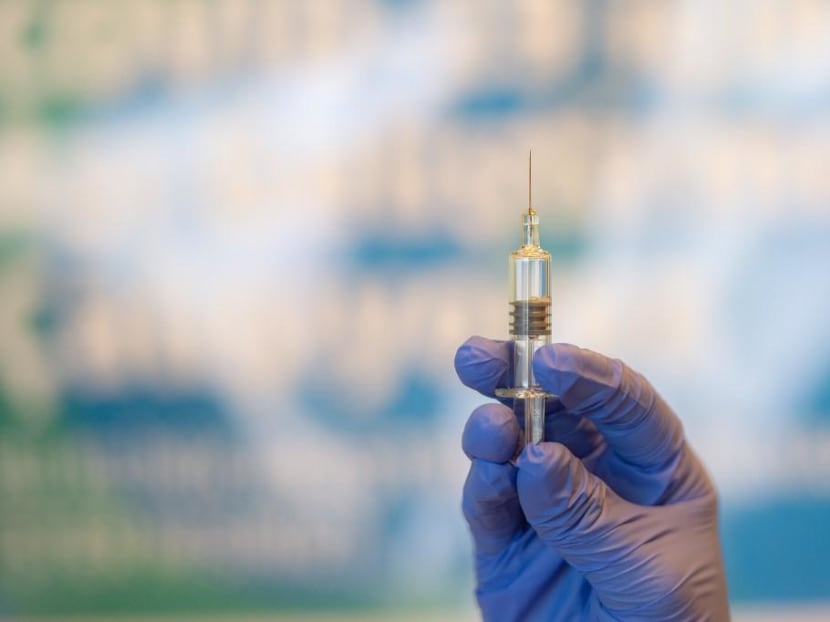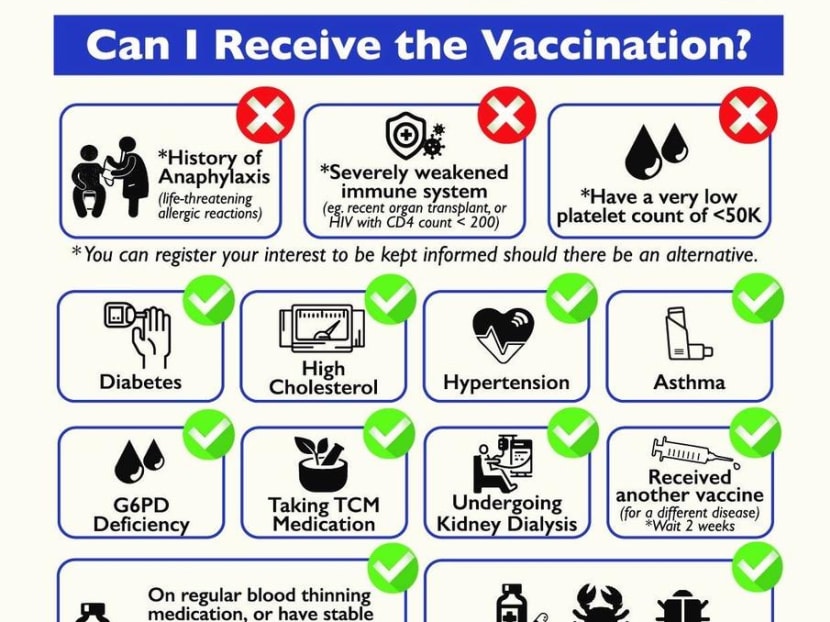MOH eases Covid-19 vaccination guidelines for those with multiple allergies, cancer patients not in treatment
SINGAPORE — The Ministry of Health (MOH) has relaxed its Covid-19 vaccination guidelines for some people with allergies so long as they do not have a history of anaphylaxis, which is a type of life-threatening allergic reaction.

The Ministry of Health has relaxed its guidelines on Covid-19 vaccination for some people with allergies.
- The Ministry of Health issued Covid-19 vaccination updates via a circular to medical professionals last week
- The ministry also updated the FAQ section on its website to reflect new guidelines
- Previously, people with multiple allergies were advised to defer their vaccination
- The changes come after some people with drug allergies were turned away from getting the jab
- The revisions were based on the latest domestic and overseas scientific information
SINGAPORE — The Ministry of Health (MOH) has relaxed its Covid-19 vaccination guidelines for some people with allergies, so long as they do not have a history of anaphylaxis, which is a type of life-threatening allergic reaction.
This includes people with a history of allergic reactions to certain anti-inflammatory drugs, so long as they have not suffered from anaphylaxis.
Anaphylaxis is when someone experiences two or more of the following criteria: Hives or swelling in the face, eyelids, lips or throat, difficulty breathing, and dizziness.
These groups of people were previously advised to defer their vaccination, but can now receive the Pfizer-BioNTech and Moderna vaccines — the only two Covid-19 vaccines that have been approved for use in Singapore.
In addition, people who have active cancer, but have not been in treatment for the last three months and do not have any treatments planned in the next two months, may also be inoculated.
MOH gave these updates in a circular to doctors, clinics, licensed hospitals and vaccination centres last Friday (March 12), a copy of which was seen by TODAY.

Infographic: Ministry of Health
Several general practitioners whom TODAY contacted confirmed that they received the circular last week.
MOh also updated the frequently-asked-question (FAQ) section of its website on Saturday to reflect these changes.
On the website, it explained that the vaccination guidelines were relaxed for those with a history of skin swelling set off by non-steroidal anti-inflammatory drugs because emerging scientific evidence here and abroad has shown that these individuals can be vaccinated with a messenger ribonucleic acid (mRNA)-based Covid-19 vaccine — so long as there are no other life-threatening signs and symptoms of anaphylaxis.
Both Pfizer-BioNTech and Moderna vaccines are mRNA-based Covid-19 vaccines.
Similarly, scientific evidence has shown that those with multiple allergies can be vaccinated so long as their allergies are not life-threatening in nature.
The ministry added that it is the severity of the allergies, rather than the number of allergies, that determines if a person can be vaccinated.
As for those with active cancer, MOH said on its website that those who are not on treatment with chemotherapy, radiotherapy or immunotherapy can be vaccinated.
Those who have a history of cancer and are in remission, and those on active cancer hormonal therapy, can receive the jab.
Women who are breastfeeding can also get the jab, MOH said, but it advised that they could consider stopping breastfeeding for five to seven days after receiving the vaccine.
In the circular to medical professionals, the ministry said that those with a history of severe allergic reactions or are being treated for cancer may be eligible for other Covid-19 vaccines down the line, though it did not specify which ones.
Last month, Singapore received the first shipment of China’s Sinovac Covid-19 vaccine, but the Health Science Authority has yet to authorise it for use.
In an interview with the British news media BBC on March 2, Prime Minister Lee Hsien Loong said Singapore will use vaccines from any source so long as they prove to be safe and effective.
SUMMARY OF UPDATED GUIDANCE
You can get vaccinated even if you...
Have a history of allergic reactions to any drug — including anti-inflammatory drugs — food, insect stings, or unknown triggers, so long as the allergic reaction does not amount to anaphylaxis
Have a history of multiple allergies, so long as they do not amount to anaphylaxis
Have a family history of anaphylaxis (but not a personal history of anaphylaxis)
Have a genetic tendency to develop allergic diseases such as eczema, allergic rhinitis or asthma
You should postpone your vaccination if you…
Have a history of allergic reactions to other vaccines. This includes having a rash, hives, or swelling in the face, eyelids or lips. This group of patients should also consult an allergist to assess his or her suitability to get the jab
Have a history of severe allergic reaction to drugs, vaccines, food, insect stings or unknown triggers
Have previously been prescribed an epinephrine auto-injector (epi-pen), a life-saving medication used when someone is experiencing a severe allergic reaction
Have a history of an allergic reaction to a previous dose of the Pfizer-BioNTech or Moderna Covid-19 vaccines, or any of its components. This includes people who experience a severe allergic reaction after the first dose of either vaccine; people who develop hives or deep swelling under the skin within seven days after taking the shot; and people who develop skin lesions within seven days after getting vaccinated
Have had any of the following severe drug reactions: Stevens-Johnsons syndrome; toxic epidermal necrolysis; drug rash with eosinophilia and systemic symptoms; drug-induced hypersensitivity syndrome
CONCERNS FROM THE PUBLIC
The updated guidelines came after some members of the public said that they were rejected from making a vaccination appointment when they indicated that they had a history of drug allergies, no matter how serious the allergies were.
Mr Alan John said that his 92-year-old neighbour was not allowed to make an appointment to get the Covid-19 vaccine after she indicated in the online registration form that she has a history of drug allergies.
The 67-year-old journalist had assisted his neighbour to register for the vaccination exercise online after she asked for his help on March 3.
Mr John said that the form gave no option to indicate whether the drug allergy was severe or not.
Since then, his neighbour has been invited to make an appointment to get the jab over the past week.











